Mighty Microsoft wants us to Say goodbye to Microsoft Office 2003, and I am happy to comply. In fact I already did. Just not the way MS wanted me to: instead of Office 2007 I migrated to Office 2.0, and, given how many people read this post (around 60k so far), I am definitely not alone.
Ironically just hours after reading the Microsoft discussion on Techmeme, another one started– this time on Web Office Suite: Who’s Leading The Pack? I do have my (biased) opinion, but the short, perhaps surprising answer: it does not matter. As to the bias, I am an Advisor to Zoho – so take everything I say with a grain of salt. In fact take everything anyone says with a grain of salt – we’re talking about freely available systems, go ahead, try them yourself.
My bias aside I still picked the apps I think keep me most productive, and for now it is Gmail from Google and all other services from Zoho. Yes, this means there are a few things I prefer in Gmail over Zoho Mail – but I’m actually using both, and due to Gmail’s architecture and a trick in Zoho Mail, my email is always in sync, no matter which one I access. Zoho Mail is currently in private beta, and I expect it to improve significantly before the public launch. (Yes, one day I don’t want to have to say I prefer Gmail )
For word processing, spreadsheet, presentation…etc. needs I do consider Zoho the better choice. There is the quantitative approach taken by ReadWriteWeb, i.e. Zoho simply has far more productivity apps than Google – but to me it’s the quality of the individual services, and as such, it’s clearly a subjective assessment. I’m in good company though – see the MIT Technology Review, Gartner and countless blogs in agreement.
Integration between all these applications is an area where Zoho’s homegrown strategy is starting to show results: for a good example just look at how Zoho Meeting sessions (the product announced today) can simply be embedded into Zoho Show slides. Compare it to today’s big news: Google’s presentation product will be piecemeal-ed together from technology and talent acquired from Zenter and previously Tonic Systems, and perhaps one day integrated with the other Google Apps acquired elsewhere. With this acquisition Google is on equal footing with Zoho, says Om Malik. I doubt it, but frankly, that statement is quite a compliment to Zoho. . Anyway, the shopping-spree vs. homegrown integrated products comparison reminds me of the Oracle vs. SAP match in the Big Boys League (Enterprise Software).
. Anyway, the shopping-spree vs. homegrown integrated products comparison reminds me of the Oracle vs. SAP match in the Big Boys League (Enterprise Software).
I’ve started this article by saying it does not matter who’s better. Time to explain what I mean. I have no doubt Google will be the Web Office Suite market leader. It’s so simple: Zoho has more applications, of better quality, more integrated – but they don’t have Google’s clout. But this is not a winner-take-it-all, zero-sum game: all players, including Google and Zoho are creating a new, emerging market. It’s not about slicing the pie yet, it’s about making sure the pie will be huge – and Google’s brand is the best guarantee to achieving that. Little Zoho can be a tremendously successful business being second to Google. There will always be room for a second .. third… perhaps fourth. Data privacy, the quality of the products, better service, or just having a choice – there will always be reasons for customers to opt for a non-Google solution.
There’s more. Now that ZDNet’s Dan Farber “outed” it, we can talk about Zoho’s further plans, including Business Edition, coming later this year. (Dan’s story is actually the best backgrounder on “all things Zoho” I’ve seen published recently – I guess it was a productive yacht party . ) Zoho does not stop at “Office” applications: Dan hints at ERP and other business applications. Almost a year ago I wrote a (then) speculative post: From Office Suite to Business Suite, and being the lazy guy I am, I’ll just quote myself here:
. ) Zoho does not stop at “Office” applications: Dan hints at ERP and other business applications. Almost a year ago I wrote a (then) speculative post: From Office Suite to Business Suite, and being the lazy guy I am, I’ll just quote myself here:
“How about transactional business systems? Zoho has a CRM solution – big deal, one might say, the market is saturated with CRM solutions. However, what Zoho has here goes way beyond the scope of traditional CRM: they support Sales Order Management, Procurement, Inventory Management, Invoicing – to this ex-ERP guy it appears Zoho has the makings of a CRM+ERP solution, under the disguise of the CRM label.
Think about it. All they need is the addition Accounting, and Zoho can come up with an unparalleled Small Business Suite, which includes the productivity suite (what we now consider the Office Suite) and all process-driven, transactional systems: something like NetSuite + Microsoft, targeted for SMB’s.”
Hm… today some of the above is no longer pure speculation. If I expected Google to be the Web Office market leader, I can’t even begin to predict what happens to hosted business applications.
Google has no offering in this market, and although there was a lot of speculation about them buying Salesforce.com, the “big announcement” was a disappointment. Of course they could still pull off a deal – but I wouldn’t, if I were Google. Don’t get me wrong: I would actually like to see Google enter this market, since they have the clout to effectively create and expand it. I even know who they should buy (no, it does not start with Z) – but that’s a subject of another post.
Summing it all up, I believe the winner of the “on-demand race” will not be Google, Zoho, or any of their competitors – the winners will be the customers who will have a lot more choice in picking the right business solutions later this year.
Update (7/6): Zoho vs Google Docs, of all places at Google Operating System.

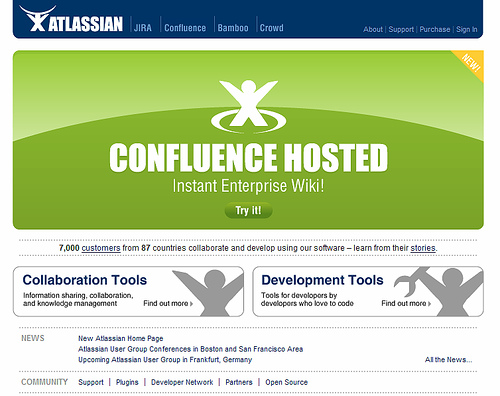
 Oh, well, if you want to find out more about Atlassian, you can attend their user
Oh, well, if you want to find out more about Atlassian, you can attend their user 

 the look-and-feel of spreadsheets than with task management / project management systems. I think it’s a great approach – no wonder Smartsheet won two awards at the recent Under the Radar Office 2.0 event.
the look-and-feel of spreadsheets than with task management / project management systems. I think it’s a great approach – no wonder Smartsheet won two awards at the recent Under the Radar Office 2.0 event. 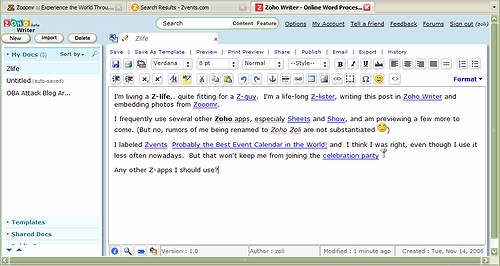
 I’m really glad to have witnessed the exemplary co-operation between two of my Z-portfolio companies,
I’m really glad to have witnessed the exemplary co-operation between two of my Z-portfolio companies,  )
) was great, and thanks for the
was great, and thanks for the 
 Whenever Zoho releases a new product, the “default” comparison is to relevant Google products. Perhaps it’s because of this “reflex” that
Whenever Zoho releases a new product, the “default” comparison is to relevant Google products. Perhaps it’s because of this “reflex” that 
 (Updated)
(Updated)
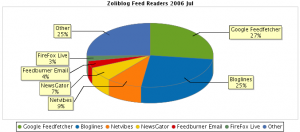
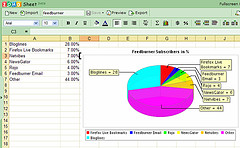
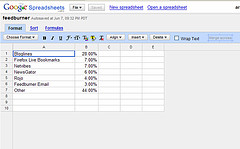 Almost a year ago I wrote about a
Almost a year ago I wrote about a 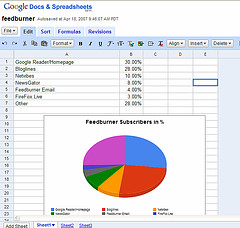
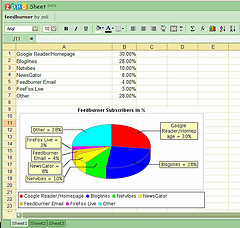
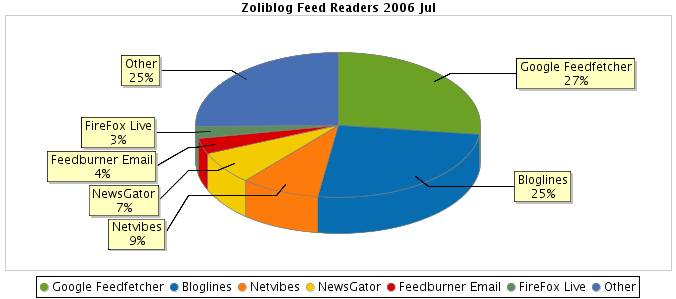 The chart to the right is not an image, any changes in the originating spreadsheet will be immediately reflected in the published article.
The chart to the right is not an image, any changes in the originating spreadsheet will be immediately reflected in the published article.

Recent Comments